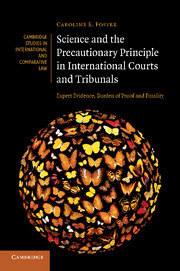 Science and the Precautionary Principle in International Courts and Tribunals
Science and the Precautionary Principle in International Courts and Tribunals Book contents
3 - Methods for taking expert evidence in scientific disputes
Published online by Cambridge University Press: 11 April 2011
Summary
Sound decision-making is essential in an international legal system where submission to jurisdiction is voluntary and many of the interests at stake are important, sensitive and complex. International courts and tribunals must carry out their functions thoroughly and on the basis of a full understanding of the facts. They must ensure that they are in a position to appreciate the disputed policy choices made by the states appearing before them, and to perform their role wisely with a view to the stability and development of the law, as well as to the importance of ongoing relations between the parties. The task of the international adjudicator today is not simply to choose between two competing conceptions of the facts presented in adversarial fashion.
As a result of the closeness of law and fact in the type of dispute that is the subject of this book, international adjudication is changing. Most obvious and most fundamental is the shift in the role of expert witnesses. The complexity of the science requires heavy consultation with experts, and considerable reliance on their testimony. Inevitably, it seems, experts will be drawn into questions of legal interpretation through their involvement in the application of legal terms. The insights offered by a scientific expert will help determine the application of a legal concept such as ‘necessity’ or ‘reasonableness’ in the case at hand – and in the course of this process the scientific expert's advice will also come to shape the development of the conventions and usages on which the established meaning of the legal concept of ‘necessity’ or ‘reasonableness’ in the context of the provision in question will be based.
- Type
- Chapter
- Information
- Science and the Precautionary Principle in International Courts and TribunalsExpert Evidence, Burden of Proof and Finality, pp. 77 - 135Publisher: Cambridge University PressPrint publication year: 2011


